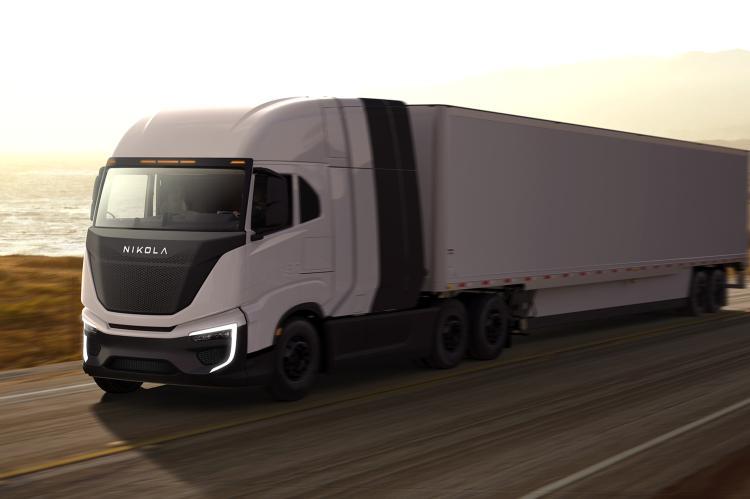Nikola Partners With Pipeline Giant TC Energy To Develop Hydrogen Hubs For Fuel Cell Truck

Nikola Corporation (Nasdaq: NKLA), a global leader in pollution-free cell electric truck fuel and green energy infrastructure solutions, gets an enormous boost in a new partnership with one of the leading Pipeline giants in North America, TC Energy (TSX, NYSE: TRP).
The strategic collaboration between the two giant energy infrastructure companies announced on October 7, 2021, aims to develop, construct, operate, and co-own large-scale hydrogen hubs in the US and Canada to serve the ever-growing need for zero-emission heavy-duty trucks.
One of the key objectives of the strategic partnership is to establish high-capacity hydrogen hubs to provide more hydrogen fuel near high-traffic truck corridors in places such as Southwest, California, Arizona, and places requiring high-volume hydrogen hubs for fueling Nikola's planned Class 8 FCEVs.
"We are excited to have a strategic partnership with a North American energy leader focused on delivering low-carbon and hydrogen-based energy solutions," said Nikola President, Energy, and Commercial, Pablo Koziner, while disclosing the company's new partnership details.
"This collaboration with TC Energy is intended to enable the production of hydrogen at quantities and costs that are required to support customer adoption and use of FCEVs. TC Energy also offers pipeline distribution capabilities that will be essential for the cost-efficient movement of hydrogen in the future," he added.
Nikola and TC Energy will actively collaborate in identifying and developing infrastructures required to deliver large-scale low-carbon hydrogen at low cost to accelerate the adoption of zero-emission heavy-duty fuel cell trucks. The two companies also aim at providing clean hydrogen used in industrial sectors by building high-volume hubs at strategic geographic locations.
"We have laid out a target to identify opportunities within the next five years," Nikola's Kozinern told Forbes. "We have certainly started to look at the areas that we believe will be the highest demand for hydrogen in all respects, but certainly paying a lot of attention to the density of commercial traffic," he added.
Unlike Nikola's initial plan for hydrogen stations producing up to 8 tons of clean hydrogen for daily use, the anticipated new hubs will generate at least 150 tons of clean hydrogen per day for FCEV trucks and the company's customers. However, the partnership doesn't include TC Energy's investment in Nikola.
According to Nikola, their initial plan of an 8-ton hydrogen hub would provide hydrogen fuel for at least 200 trucks per day. In comparison, the anticipated 150-ton hydrogen hub will produce enough hydrogen to fuel thousands of trucks daily.
Both Nikola and TC Energy are committed to a common goal of reducing the carbon intensity of hydrogen produced in their facilities and delivered to end-user customers. To achieve their goal of producing low-emission and cost-effective hydrogen fuel, the two companies utilize renewable energy, renewable natural gas, low-cost natural gas, biomass feedstock compounded with carbon capture as well as storage.
TC Energy Senior Vice President and President of the company's power & storage division, Corey Hessen, underscored the significance of the partnership, saying it's an important first step for TC energy towards meeting their market needs.
"By leveraging our natural gas and power operations footprint, we see this new partnership as an important first step in facilitating access to affordable low-carbon production of hydrogen for the transportation and industrial sector," said Hessen.
"TC Energy is focused on our own decarbonization efforts as well as being the provider of choice for carbon-free energy to the North American industrial, natural gas, and oil sectors. Nikola as a partner and as a customer aligns well with that approach," Hessen emphasized. TC Energy Corp is also behind the recently cancelled controversial Keystone XL pipeline project.
Ahead of delivering a commercial fleet of fuel cell trucks, Nikola plans to deliver its first fleet of battery-powered Tre semi towards the end of the year as the production of its initial models is in progress at a plant operated by its vehicle manufacturing partner, Iveco, located in Ulm, Germany.
Production of a battery-powered version of Tre is expected to begin next year at Nikola's Coolidge plant in Arizona before commencing fuel cell electric Tre models production from 2023. The company plans also plans to build bigger and long-range Nikola Two semi models by 2024.
The Nikola's alliance with TC Energy is the latest in the company's string of partnerships unveiled recently in an effort to overcome legal problems the founder, Trevor Milton, is currently facing and stay focused on selling heavy-duty hydrogen and battery-powered trucks.
However, Nikola is not alone in utilizing flagship technology to develop an emission-free heavy-duty fleet as Toyota, Hyundai Motor, Hino, Volvo, Cummins, General Motors, Navistar, and Daimler already have their hydrogen-fuel plants.
According to experts, the technology is better suited for long-range trucks driving hundreds of miles daily compared to multi-ton batteries. Additionally, the hydrogen-powered trains are lighter and quick to fuel, just like a diesel truck.

